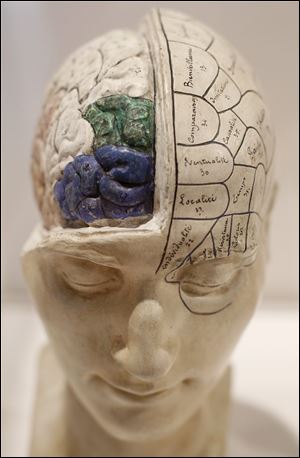
Some changes in mental health handbook considered controversial
6/10/2013
Considerable debate was under way even before last month’s release of the newest edition of the Diagnostic and Statistical Manual of Mental Disorders by the American Psychiatric Association. The manual used by mental health professionals such as psychologists, psychiatrists, and counselors contains a number of changes that are considered controversial.
Considerable debate was under way even before last month’s release of the newest edition of the Diagnostic and Statistical Manual of Mental Disorders by the American Psychiatric Association.
The manual used by mental health professionals such as psychologists, psychiatrists, and counselors contains a number of changes that are considered controversial.
For example, a person grieving for more than two weeks could be described as having a symptom of mental illness under the new guidelines, and grief counselors oppose that assessment in the new DSM-5, as the manual is known.
An article in the May 18 edition of Psychology Today states that “ ‘grief is not a pathological condition,’ these grief counselors maintain, ‘not an illness to be treated or cured,’ but ‘a healthy response to a painful reality ... Absorbing this loss, and adapting to all the changes it unleashes, has its own unique course for every person’.”
While that is only one area of the new manual that is problematic for some clinicians, some of the new aspects make sense for University of Toledo professor Nick Piazza.
The new edition, which was first conceived 14 years ago, is a major revision of DSM-IV-TR, which was published in 1994. The publication has long been used to help clinicians diagnose mental health disorders ranging from anxiety and depression to schizophrenia and addiction.
“DSM-5 is trying to make a transition from a categorical cookbook to something that’s built on a continuum,” said Mr. Piazza, a licensed professional clinical counselor and psychologist.
“Some people have autism bad and some have a little of it. It’s not a question of different types of disorders, but degrees of disorders,” he said. “It’s more a transitional document as opposed to the last word on how things are done.”
Mr. Piazza takes a neutral position toward the DSM-5.
“Those who believe in categories and pigeon holes are not pleased with the continuum approach to diagnosis,” he said. “Those who feel that if their particular diagnosis is no longer in the manual, they may lose access to treatment services.”
One of the DSM-5's most controversial revisions is to remove the diagnosis of Asperger's and put it under the category of autism spectrum disorder, a change that angered the parents of children who feel there is more of a stigma associated with autism.
"There are a number of conditions like that. For decades people have argued that schizophrenia is a spectrum disorder," Mr. Piazza said. "Think of a rainbow. It has distinct colors," such as red, orange, and so on, he said.
"But the area between red and orange is hard to tell. We can differentiate between depression and anxiety, but there is some overlap where it's hard to tell the difference. For years, there was red, yellow, orange autism. But now, instead of saying people have a type of autism, we say they have autism and then describe it. So people are uniquely and personally described. The new manual will result in more individualized descriptions."
Mr. Piazza admitted some skepticism, particularly with regard to the manual's view on grief.
"Grief and mourning are not something you get over in a couple of weeks. If you go back 100 years, they say the minimal acceptable period of mourning is at least a year. So to say you have to get over it in a couple of weeks strikes me as a little over the top," he said. "I am concerned about medicalizing normal human experiences, like grief and mourning."
He also gives an interesting view on the controversy about the new manual labeling one in six cancer and heart disease patients as having mental illness.
"What you discover is that anybody with a chronic illness, all of that can produce a psychiatric condition," he said.
"And another thing to keep in mind too is that if you have a chronic condition, such as back pain, dealing with that over an extended period of time can wear you down and produce psychiatric symptoms.
"In a lot of cases people struggle with a medical condition and it wears on their resilience and makes them more vulnerable. Just imagine if you had to deal with chronic back pain 24 hours, seven days a week. You might be able to do that for a few days or weeks, but there are people who deal with that for a few years and for the rest of their lives, and that's a pretty wearing experience."
Mr. Piazza said some groups undoubtedly will reject DSM-5.
"Especially in the area of research. In fact, the National Institute of Health says it will not use DSM-5. It is useful for helping clinicians communicate with one another and that's its principle purpose," he added.
Contact Rose Russell atrrussell@theblade.com or 419-724-6178.